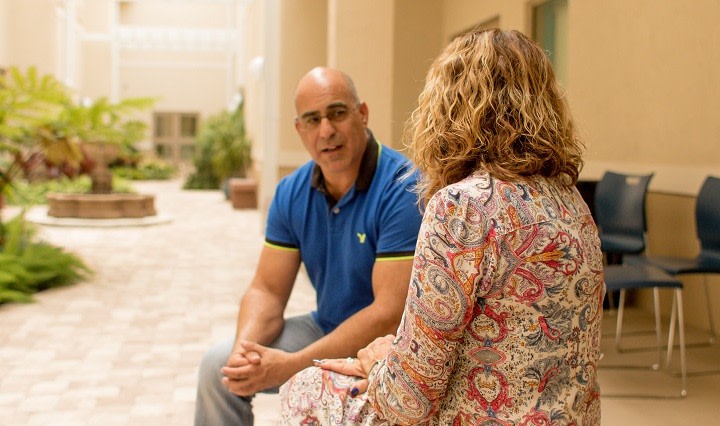How We Treat Patients with Anxiety
Patients with anxiety present a number of symptoms that can dominate their lives and influence the decisions they make. One of our first steps in assessing a patient with an acute anxiety disorder would be to arrange a consultation with a psychiatrist to administer a diagnosis, and if medicine is prescribed, our nursing department oversees the dispensation of the prescription.
The use of medication in treating anxiety is extremely common and isn’t something to be frowned upon; in fact, it helps stabilize our patients and prepare them for the long-term management of anxiety, which is achieved through counseling.
Our psychologists and counselors are trained in a number of clinical specialties like cognitive behavioral therapy, a form of psychotherapy that has been shown to be extremely effective in counteracting anxiety. Through private and group sessions, our counselors work hand-in-hand with our patients to help them get to the root of anxiety – not just the thoughts the create anxiety, but the tendencies too – and overcome them, to prevent the runaway train effect that anxiety can present.
We offer many of these same treatments at both the residential and outpatient levels of care, meaning that group or private sessions and psychotherapy are accessible to any patient who needs them.


How Common is Anxiety?
Anxiety disorders in the United States are incredibly common. Estimates show that approximately 18.1 percent of the American adult population (about 40 million people) experiences some form of anxiety in a given year. In some cases, feelings of anxiety are both normal and healthy.
What is Anxiety Disorder?
Anxiety disorders are different from the general stress and worry that individuals feel in the face of uncomfortable or uncontrollable situations, instead presenting as excessive fears or worry that impact an individual’s ability to lead a full and productive life. Types of anxiety disorders include generalized anxiety disorder, panic disorder, social anxiety disorder, separation anxiety disorder, and more.
Symptoms of anxiety disorder include stress that is out of proportion to an event or its potential impact. This stress is coupled with an inability to find relief, and may also present with restlessness, panic, and/or concerning thought patterns. As mentioned above, causes of anxiety may be genetic, psychological, or environmental. They can also be developmental, with influxes of anxiety at certain stages of a person’s life.
The Diagnostic and Statistical Manual of Mental Disorders (DSM) does recognize generalized anxiety disorder as a legitimate mental illness. Health professionals are able to identify generalized anxiety disorder by one of the following criteria outlined in the DSM:
(1) Excessive worry that occurs more often than not over a 6 month period;
(2) Worry that is challenging to control and may shift from one trigger to another;
(3) Anxiety accompanied by physical symptoms, such as fatigue, restlessness, difficulty sleeping, or impaired concentration.
Related conditions that may co-currently appear with anxiety include sleep disorders, eating disorders, substance use disorders, and chronic headaches, among others.
What is an Anxiety Attack?
An anxiety attack is an intense onrush of anxiety that may be triggered by a specific event or nothing at all. Symptoms include:
- Sudden feelings of intense fear
- Racing heart
- Sweating
- Shortness of breath
- Chest pain
- Dizziness
- Nausea
- Trembling
- Hot flashes or chills
Symptoms may be accompanied by confusion, a tightening of the throat, or other physical manifestations.
How to Help Anxiety
At Retreat Behavioral Health, we offer medical and holistic therapies designed to help patients learn to manage their anxiety. We provide individualized treatment plans that address specific anxiety disorders and their symptoms, as well as tools that help individuals navigate life outside of the treatment setting. For more information, please contact us at 855.859.8810.

Call (855) 859-8808 for direct assistance
